- Home
- Al Sarrantonio
The Orangefield Cycle Omnibus Page 8
The Orangefield Cycle Omnibus Read online
Page 8
Ahhhhh…
The discomforting noise he made caused another noise out of his vision, a shuffling like a dog had been disturbed. He could not see. Except for the upside-down poster and an upside-down coat hook next to it with a rain coat which was hung near the floor and ran up the wall (again: funny! And despite his queasy stomach he gurgled a short laugh) he could see little else. The wall was colored chocolate brown, and it was stuffy in the room.
Again he heard the dog-shuffle.
Something new came into his view, in front of the wall poster — something just as brightly colored. It was accompanied by the shuffling noise, which was caused, Jody saw, when he strained his eyes to look up (which hurt) by the slow movement of a pair of huge clown feet, which were red with bright yellow laces. His vision in that direction was impeded by a sort of cap that appeared to be on his head, though he felt nothing there. There was a sharp rim, and he could see no farther. What he saw of the ceiling under the clown’s feet, was the same color as the wall.
Jody looked down, and his sight trailed over the figure of a circus clown dressed in blue pants, a red and green-striped blouse with baggy sleeves and white gloves, and a white face with impossibly wide, bright red smile, eyelashes painted all around his eyes, all topped by a snow-white cap with a red pom-pom.
The shuffling stopped; the clown was facing him now and Jody noted that the figure’s real lips inside the painted-on smile weren’t smiling. The eyes looked serious inside their cartoon lashes, too.
“Ted?” The clown whispered, in an impossibly gentle voice. “You’re awake, Ted?”
Jody tried to tell the clown that his name wasn’t Ted, but the feared throw-up rose hotly in his throat, out his mouth and ran up his face.
It was now, through the paint smell and dizziness and headache, that he realized he was upside-down, not the room.
The clown tsk-tsked, and a wet cloth was pressed to Jody’s nose and cheeks, rubbed gently.
The bile was gone.
It was getting very stuffy in the room.
“Soon, Ted, soon…” the clown said, and then he shuffled out of Jody’s sight.
“I—” Jody managed to get out.
The shuffling stopped. “Yes?” the clown asked, and there was a closed-in hush in the room.
“I…no…Ted…” Jody spit out, along with more bile, before his vision began to blur.
“I know, Ted. Yes,” the Clown answered, in what was almost a sing-song whisper.
Then, Jody closed his eyes.
When he opened them again, he was hungry.
The paint smell was still there, and the queasiness, and the headache, which was worse now, and he was still upside-down and couldn’t move. But, somehow, he felt more alert.
He saw immediately that the poster — UNCLE LOLLIPOP LOVES YOU! — was partially blocked by a familiar sight: the Pumpkin Boy, or at least part of him. The Pumpkin Boy’s chest, which was a thicker tube of metal than the articulated stalks that composed his arms, was open, revealing a cavity within with something red, suspended in a web of golden wire that throbbed darkly. The web shivered noticeably with each beat. The cavity’s door lay hinged back against the Pumpkin Boy’s side. He seemed to be missing from the legs down (or up, to Jody’s eyes) and his head was hinged open on the top. Now, in the light, Jody saw that the head itself looked to be made of some sort of ceramic or plastic or other hard surface; it was too hard-edged and brightly colored (a hue as bright as the poster colors, and the Clown suit colors) to be real. There were no seeds stuck to the inside of the lid, which looked smooth and clean.
A trail of golden wires led out of the Pumpkin Boy’s head, the back part behind the eyes, nose, and grinning mouth (could there be a hidden compartment back there?) and were bundled together with white plastic ties. There looked to be hundreds of individual hair-thin wires. The bundle ended in a curl, like a rolled hose, on the floor.
Jody saw that the Pumpkin Boy wore a pair of ordinary leather carpenter’s gloves, like the ones his mother used in the garden.
Jody now realized how quiet it was.
“Hel…lo?” he said. His voice sounded like a frog’s croak.
There was no answer.
Feeling stronger than he had before, Jody tried to twist himself around.
Whatever he was trussed to, it gave little, but it did give. He turned a bit to the right, then swung back, as if he were suspended on a rope. He had seen the wall beyond the Pumpkin Boy and the poster: flat brown, unadorned.
He twisted again, harder. His legs were asleep, which at least meant that his twisted ankle didn’t hurt anymore. His hands were also asleep, but he could feel enough of them now to discover that they were bound behind his back, tightly.
He tried for a time, but couldn’t loosen them.
This time as he turned he saw the wall and something on the true floor: a table, a bright silver machine with a big black dial and the edge of a huge white clock-face with too many numbers around the edge.
He came stubbornly back to rest.
He was growing weaker.
The Pumpkin Boy hadn’t moved, was staring straight through him.
Jody gave a mighty turn, with an ooofff!
This time he felt as if a lance had pierced his forehead. He cried out in pain — but he saw the whole silver machine, which was on casters, and other machines, one of which looked like the emergency generator Mom kept in the garage, and a door. No windows. The clown suit was draped over a single chair, next to a lamp—
The door was just opening.
Jody swung back to rest, the pain still driving through his head. He knew he was crying.
The shuffle sounded frantic.
“Ted—!”
He passed out with the man’s hands on his head, or what felt like through it.
A hum in his ears.
It sounded like bees, or millions of ants. He’d seen millions of ants once, two armies fighting in the forest, brown and black. He went back three days later and they were still fighting. His cousin Jim, who was fourteen years old, told him to make a cone out of the comic book in his back pocket and when he did, and put the wide end of the cone near the massed ants and the other, the tighter end next to his ear. He heard a roaring, a scrabble and hum that sounded like the mighty armies he saw fighting in books.
He thought Jim had played a trick on him, and took the homemade horn away from the battle, but there was Jim ten feet away from him, grinning.
“Somethin’, ain’t it?”
“Wow…”
It had sounded like this, only less so…
Jody opened his eyes. It felt, now, like his head had been split in two, like a melon. There was a dry burning behind his eyelids, and a circle of hot pain all around his head, as if a heated clamp had been tightened around it.
He heard a mewling sound, and realized it came from his mouth.
“There, Ted, there…”
A cool hand rested on his brow, above his eyes, and then withdrew.
The hot pain circling his head increased.
His eyes were watering, but he blinked and then could see, almost clearly. The Pumpkin Boy sat where he had been, staring mutely at nothing. To his right the silver machine with the big black dial and white clock face had been positioned at a slight angle; next to it, on another dolly, was a similar, smaller machine.
The thick bundle of hair-thin silver wires was now plugged into the side of the silver machine; another bundle was plugged into the opposite side of the machine and ran to the floor…
…toward Jody…
He cried out, in pain and terror—
“There, there, Ted…”
Again the soothing hand, the clown glove; as it withdrew from his face Jody saw the clown face close to his own, peering into him as if his head were a fish bowl. The lips didn’t smile, nor the eyes.
“…out!”
“Yes, Ted,” the soft voice sing-songed. “Yes…”
The clown hand came back to pat his forehead.
&
nbsp; He writhed, tried to loosen his hands, his feet, to snake down from his captivity.
The soothing voice became almost scolding.
“Ted, you mustn’t —”
The clown hand reached out to the huge black dial on the silver machine — Jody saw the hand grip it hard and twist it—
Pain came, and he went back to sleep.
Chapter Twenty
Pictures of Jody.
She didn’t know whether to take them down, put them away, turn them to the wall or put them in new frames. Nothing, Emily Wendt knew, would work. If she put them away it would be a defeat, an admission that he was gone, as well as giving up hope.
But having him staring out at her from every room in the house was almost unbearable. She had never realized how many pictures she had of her son: they were everywhere, framed on the hallway wall, in a gilt frame next to her bed, stuck under magnets on the refrigerator door, herded with other family portraits on top of the television, on the hunter’s table behind the sofa, the last Sears portrait, from Christmas, on the phone table—
In the end, she put them all away except the one next to her bed.
That had been the first portrait she’d ever had taken of him, when he was one. Phil had still been alive, then. She remembered how much trouble they had keeping Jody still; the photographer had posed him in a chair covered with a blanket and Jody, who had recently taken his first steps, kept trying to dismount the chair. It was obvious he was fascinated by the camera and wanted to study it. Finally the photographer had to let him look it over, click the shutter twice and then promise him another look if he sat still for the picture.
You’d never know he had been any trouble by looking at the finished product. The portrait showed him staring quietly, with big eyes, at the camera; his face held a measure of interest that proved he was only thinking about getting his hands on that machine again. A lick of his thin auburn hair had fallen over his brow (later his hair would thicken, becoming almost coarse; unless cut very short it tended never to stay combed or brushed for long) and his pudgy hands were folded on his lap.
This would be the picture she wouldn’t put away.
Later that day, after the session, she and Jody and Phil had gone to the taco place in the mall, the one and only time they had ever eaten out together. She still remembered what Jody had done to the burrito they had gotten him, how he had dissected it like a frog.
She found herself weeping — the first time, in the days since Jody had been taken, that she had cried. She had thought her life was over after Phil was killed, but now she knew just how much she had still possessed, even after the loss of her husband. There was a hollow place in her now that felt as if it had been scooped out with a trowel, and she knew it would never fill in.
This was nothing like it had been when Phil died.
She collapsed to the floor, hugging Jody’s picture, and sat with her legs folded beneath her, rocking and crying.
“Oh, Jody, Jody…”
She thought she heard him call her name.
She froze in mid sob, and wiped her eyes with the sleeve of her sweater.
“Jody…?”
She knew how foolish this was, but she had heard him call to her.
Forgetting the picture, she pushed herself to her feet and stumbled to the back of the house. The noise had come from the kitchen.
A blast of cold air hit her. She saw that the kitchen door leading to the backyard was open.
Holding her sweater closed and shivering, she stepped out onto the back stoop.
“Jody?” she called, almost fearfully.
The backyard was awash in unraked leaves pushed into dunes by the wind. The sky was overcast, huge banks of gray cumulus clouds rolling over one another from west to east. The temperature was falling. The pumpkin fields beyond the fence looked ominous, cold, brown and wet. The far hills surrounding Orangefield were dark, the trees stripped of green.
It looked like the landscape of a particular kind of hell.
She shivered; still holding her sweater closed, and turned around.
She gasped, and put her hand to her mouth.
There, staring straight up at her was the face of a pumpkin. Puffs of steam issued from the eyes, the nose. The surface of the face looked hard and glassy, and, from within, there was a soft orange glow.
There was a body below it, the size of an older boy or young teen, sharp angles and shiny metal. The thing had its hands on her shoulders, holding her. There were gloves on its hands, but she could feel sharp metal fingers within.
The face came closer. There was a flat metallic smell, like 3-in-1 oil. The eyes stared into her, studying her, as if watching her from a far distance.
A long puff of metallic-smelling steam hissed forth from the mouth, which was smiling impossibly wide through its two angled teeth.
The jet of steam held a word, in the form of a question:
“Mmmmmom?” Jody said.
Chapter Twenty-One
It was getting dark.
Len Schneider looked like a man who was thinking. He stood with his head down, hands in the pockets of his jacket.
He glanced at his watch.
Almost time to go.
His hands clenched into fists.
It had turned even colder. The last few days had each announced, with increasing earnestness, that autumn was here and winter wasn’t far behind. A curt wind was whipping dead leaves into some of the shallow pits they had dug. The deeper holes were filled with muddy water and leaf blankets.
There was nothing else in any of them.
Where the hell are you, you son of a bitch?
His fists clenched tighter.
“Detective? We’re gonna roll now.”
Schneider looked up to see Fran Morrison, one of the fresh-faced uniformed cops, standing in front of him. Behind the tight cluster of trees, in a small clearing, a work crew was loading shovels and other tools into a truck: an emblem on its door, in orange letters on a black background, read TOWN OF ORANGEFIELD, PUBLIC WORKS.
As Schneider watched, one of the crew opened the door, climbed into the truck and yanked it closed behind him.
Morrison was waiting for him to say something, so Schneider let out a long breath and said, “Yeah, Fran, we’re done here. You might as well go, too.”
“You need a ride back?”
Schneider looked down at his shoes, which were covered with mud. “No, I’m good.”
Morrison, almost sighing with relief, turned and was gone. A few moments later Schneider heard the young cop’s patrol car spitting leaves from its tires as it followed the truck out of the road they had made and hooked up with a dirt road a quarter of a mile away.
He was alone, now.
But he knew he wasn’t. He felt it.
“Dammit!”
His voice echoed through the forest.
He couldn’t blame Morrison and the rest of them if they thought he was obsessed. He knew he was. But there was no way he wasn’t going to do everything he could to find Jody Wendt.
And Jody Wendt was here, somewhere.
Whoever had taken him had a lair here, somewhere.
Schneider knew it.
For a moment, Jerry Carlton’s smirking face rose into his memory, wearing those goddamned mirror shades.
“Not this time,” Schneider said out loud.
Chapter Twenty-Two
“My party, this time,” Grant said.
The bar itself was crowded, but the booth area, at three o’clock in the afternoon, was nearly empty. Bill Grant placed a fifth of Dewars gently on the table, as if setting down a piece of porcelain, and sat as he produced two eight ounce glasses, one with ice, one empty. He hesitated as he pushed the empty one toward Len Schneider.
“This is the way you like it, right? Neat?”
Schneider nodded. “I didn’t think you were paying attention last time.”
Grant gave a slight smile and pushed the empty glass to the other side of the table.
Schneider was working at the cap on the bottle, and twisted it open with practiced ease.
He poured for himself, then reached across and studied the amber liquid as it trickled over the ice in Grant’s glass.
“I thought we should talk outside the office,” Grant said.
Schneider’s ears immediately pricked up; already he detected a focus in the man he hadn’t seen before.
Len replied, still looking at the scotch in Grant’s glass, “You here to give me the fatherly pep talk? I’m sure Franny Morrison and the rest of them think I’m nuts.”
He looked up from Grant’s glass to meet the other detective’s eyes. To his surprise, Grant had pulled his cigarette from his mouth and was smiling.
Schneider asked, “You think I’m nuts too?”
Grant’s smile widened. “As a matter of fact, I do. But I understand. Thing is, I know now that this case of yours is definitely weird shit.”
Schneider had downed one scotch, and refilled his own glass. Grant’s new attitude had begun to irk him just as much as his old one.
“Weird enough,” he said. “Did you hear what Jody Wendt’s mother claims happened to her yesterday? That a pumpkin-headed robot appeared on her back stoop and spoke to her in Jody’s voice?” Schneider let out a bitter laugh. “That’s weird enough for me, especially when the kid vanished like a magician’s rabbit.”
“Frankly, I find it charming. She told me the same story.”
“You interviewed her?” Schneider said with sudden anger.
“On my own time,” Grant added quickly. His smile faded a bit, and he actually looked apologetic. He lit another cigarette, blew smoke, and said, “It has nothing to do with you, Len. I just had to know.”
“Had to know what?” Schneider’s voice had risen — a few of the patrons at the bar, one of whom was a cop they both knew, looked around before turning away. Schneider finished his drink and poured a third.
Grant put his hand on Schneider’s arm. Schneider looked at the hand, still angry — but his anger drained when he saw that the familiar haunted look had returned to the other detective’s face. Grant’s skin had the yellow pallor of the tepid cloud of smoke from his cigarette.

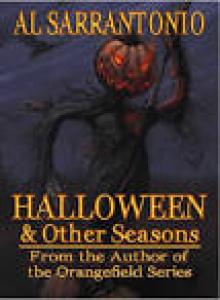 Five World Saga 01 Hornets and Others
Five World Saga 01 Hornets and Others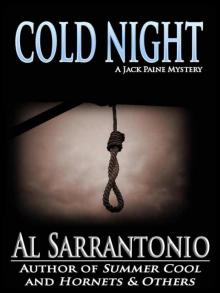 Cold Night (Jack Paine Mysteries)
Cold Night (Jack Paine Mysteries)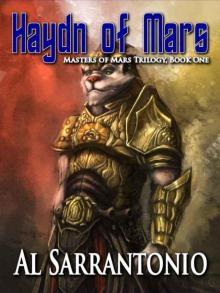 Haydn of Mars
Haydn of Mars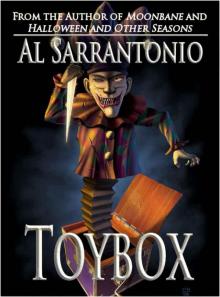 Toybox
Toybox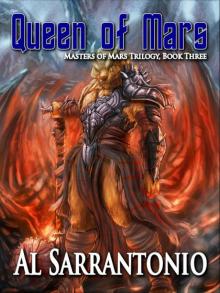 Queen of Mars - Book III in the Masters of Mars Trilogy
Queen of Mars - Book III in the Masters of Mars Trilogy Exile
Exile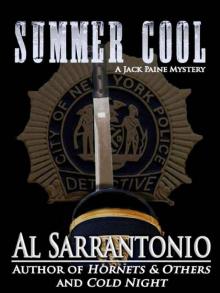 Summer Cool - A Jack Paine Mystery (Jack Paine Mysteries)
Summer Cool - A Jack Paine Mystery (Jack Paine Mysteries) Return - Book III of the Five Worlds Trilogy
Return - Book III of the Five Worlds Trilogy The Orangefield Cycle Omnibus
The Orangefield Cycle Omnibus Summer Cool jp-2
Summer Cool jp-2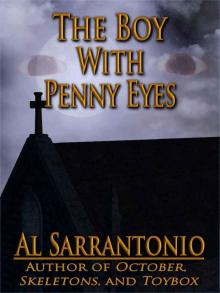 The Boy With Penny Eyes
The Boy With Penny Eyes Journey - Book II of the Five Worlds Trilogy
Journey - Book II of the Five Worlds Trilogy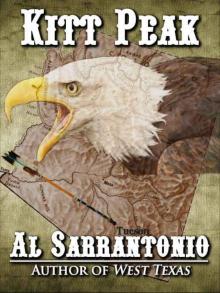 Kitt Peak
Kitt Peak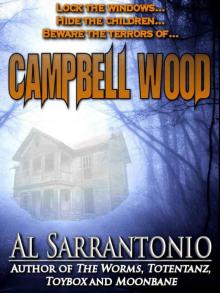 Campbell Wood
Campbell Wood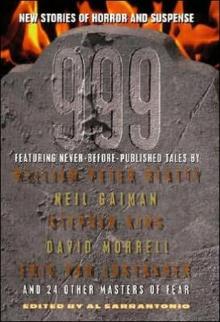 999
999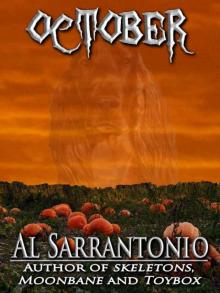 October
October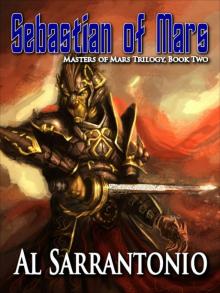 Sebastian of Mars
Sebastian of Mars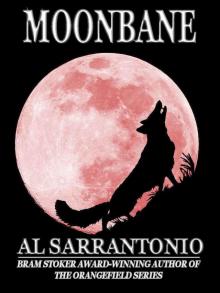 Moonbane
Moonbane Totentanz
Totentanz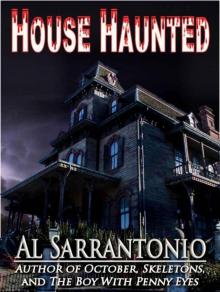 House Haunted
House Haunted Halloweenland
Halloweenland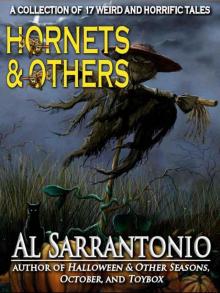 Hornets and Others
Hornets and Others